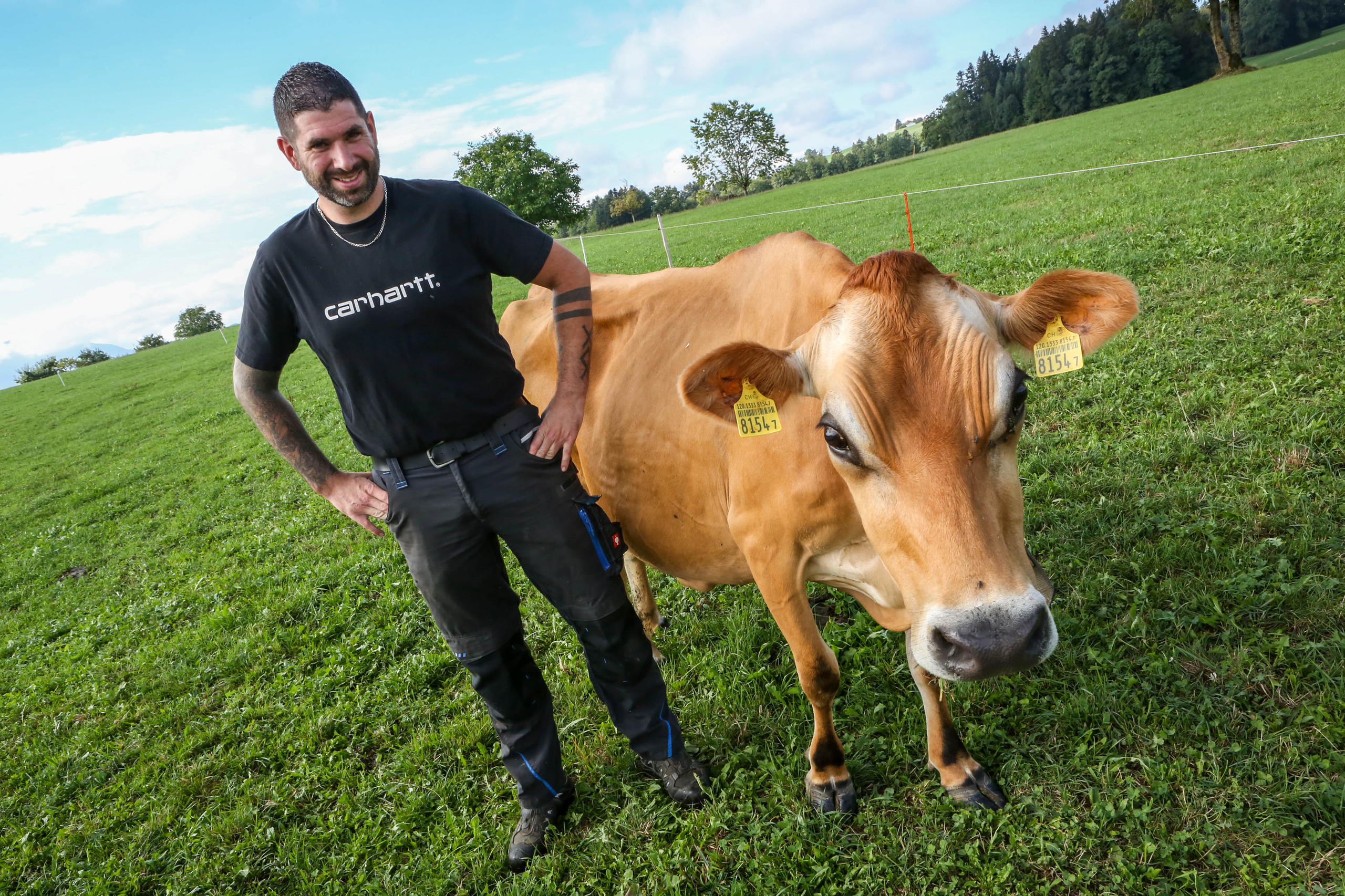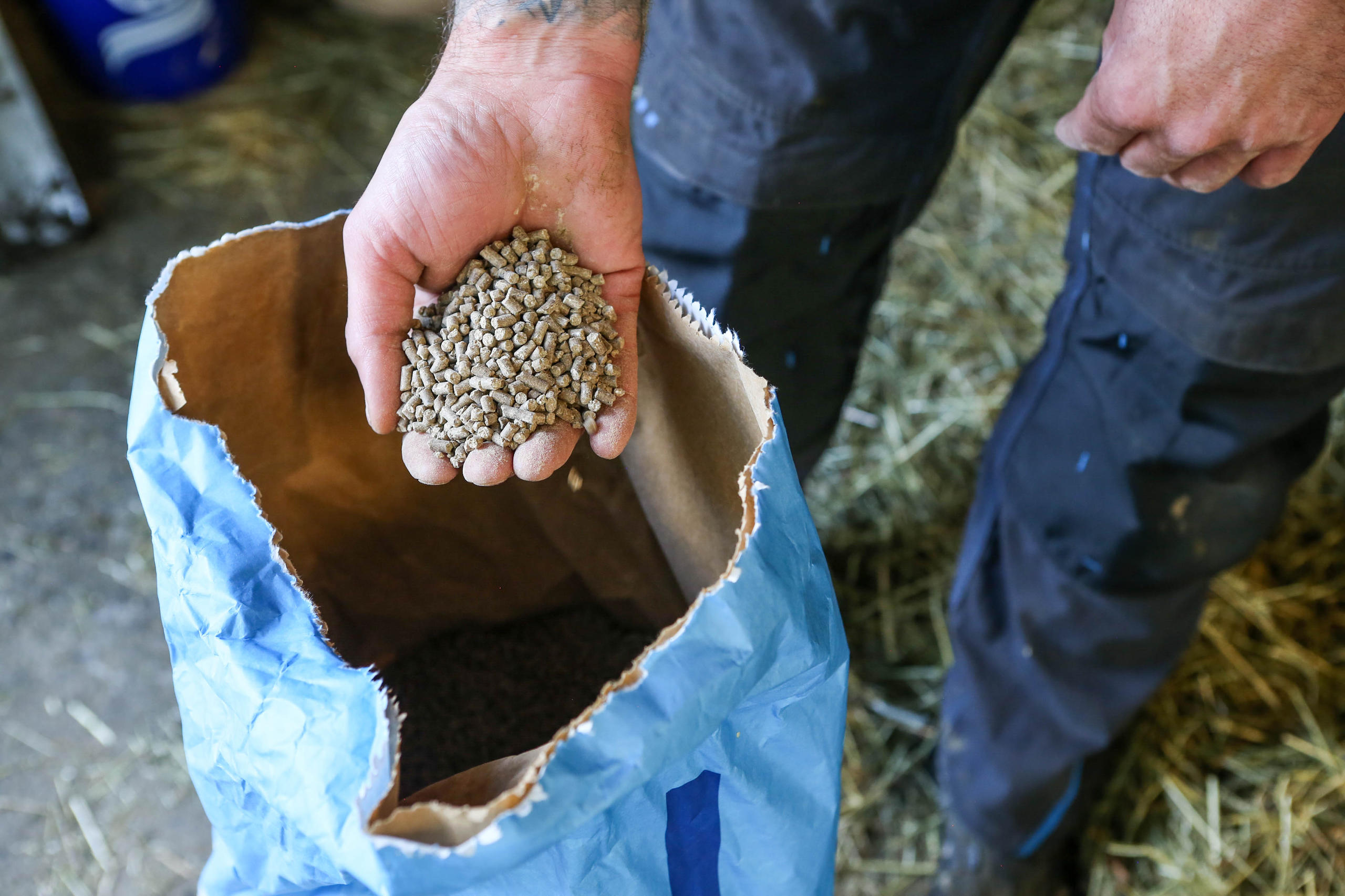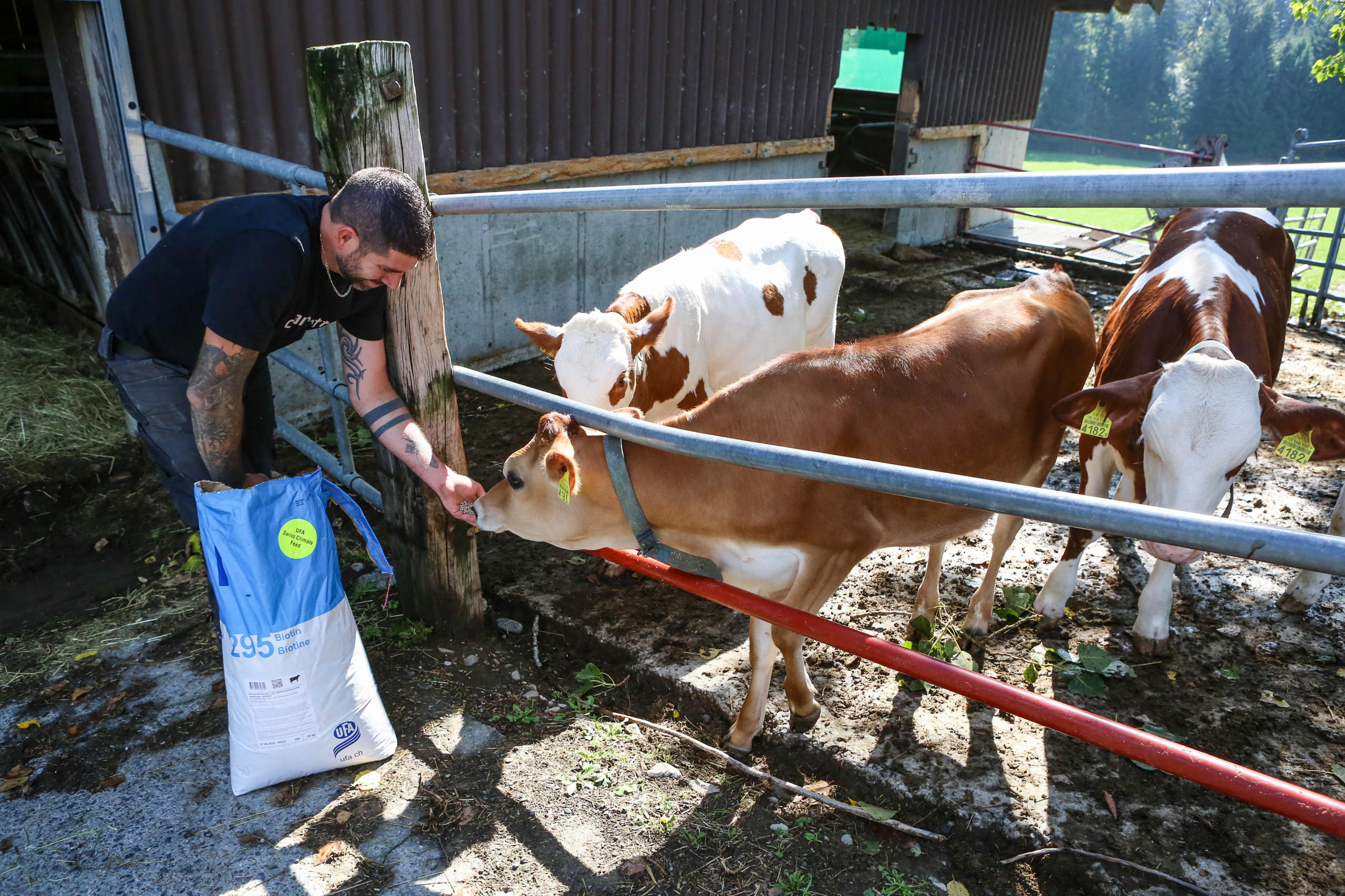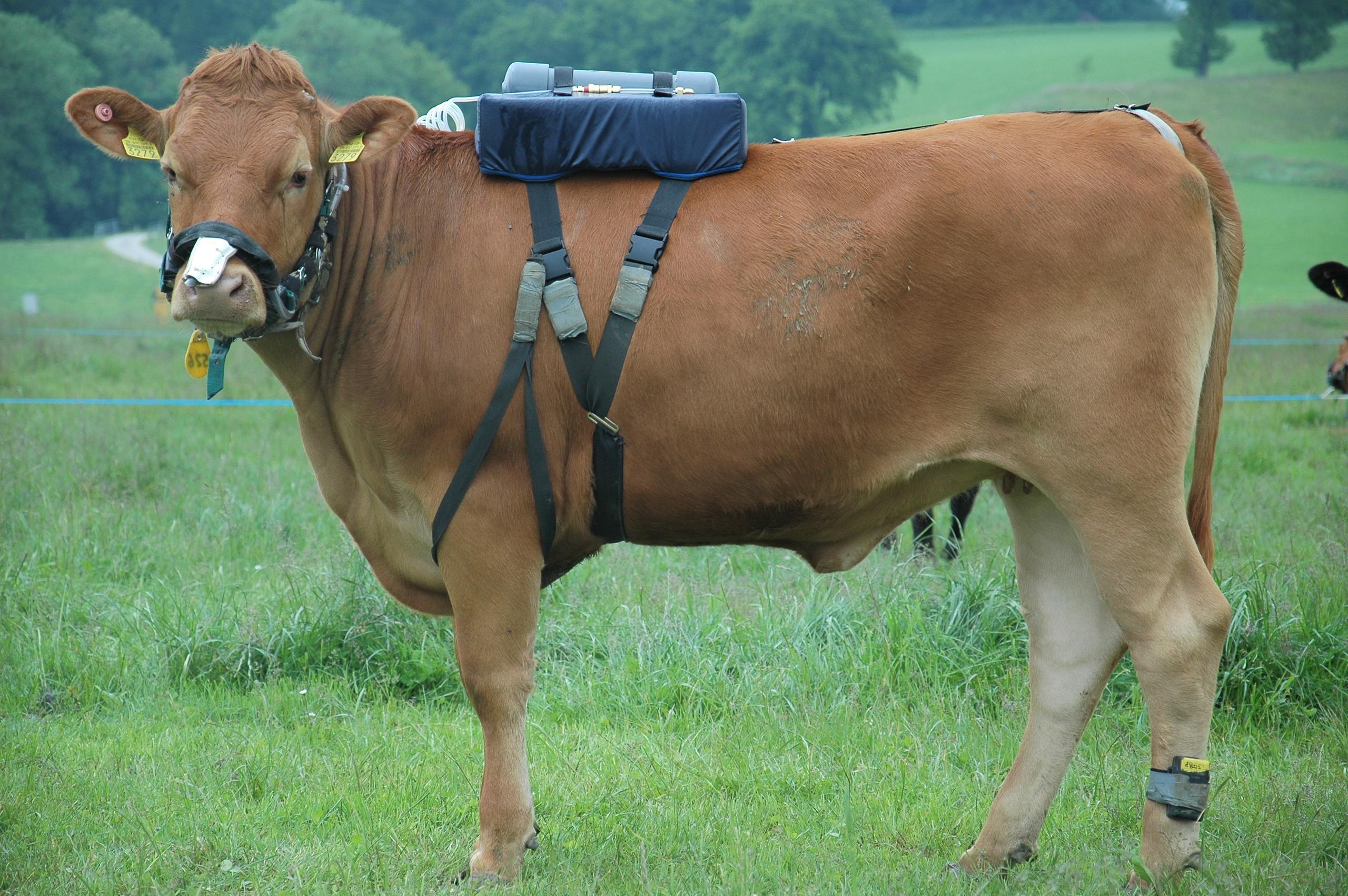
Swiss farmers trial methane-busting feed for cows

Cows not only produce milk and meat but they also emit methane, a powerful greenhouse gas. Additives in cow feed could reduce emissions from livestock farms and contribute to more sustainable agriculture. But there are questions about the long-term effects on animals.
Thomas Favre, like many young farmers, is frustrated. “We are accused of polluting, when we are doing everything we can to preserve the climate and the environment,” says the 34-year-old, who runs the family farm in the village of Le Crêt in the rolling hills of western Switzerland.
He has raised around 50 cows, mostly Montbéliarde, a mixed breed with brown patches on a white coat. Every year, he produces 150,000 litres of milk, which goes into the famous Swiss Gruyère cheese, and several hundred kilograms of meat for direct sale.
Favre’s is a typical medium-sized farm (22 hectares). The animals graze on the fenced meadows around the barn, and on this late August day some of the cattle are still up in the Alpine pastures. “All this green… they are carbon sinks,” he says, pointing to the dandelion meadows grazed by the cows. “It’s a way to contribute positively to the climate.”

But it is not only the meadows that improve the climate footprint of his cattle farm. Since winter 2021, Favre has been feeding his animals a special additive with the aim of reducing their methane emissions. The product complements a diet of grass, hay and concentrated feed. “I know several farmers who are doing the same,” he says.
In his own small way, the Fribourg-based farmer is helping to solve a global problem. Methane is a powerful greenhouse gas and without a drastic drop in its emissions in the coming years it will not be possible to limit global warming to 1.5°C.External link
Up to 120kg of methane per cow
Methane is the gas that has the greatest impact on our climate after CO2. It remains in the atmosphere for a shorter time, but its warming power is more than 80 times that of carbon dioxide over a 20-year period.
Approximately 60% of methane is anthropogenic and is linked to agricultural activities, particularly livestock farming, waste treatment and the fossil industry. The concentration of methane in the atmosphere has more than doubled since the pre-industrial era.
In cattle and other ruminants, methane is produced by bacteria in the rumen, the first of the four stomachs of the digestive tract. Methane is formed mainly when plant fibres are fermented and mostly escapes through the mouth when the animal exhales or burps. The gas is also produced when manure decomposes in the soil.
A cow emits 70-120kg of methane per year. Cattle reared worldwide for meat and milk production, together with other farm animals, release the equivalent of about 3.1 billion tonnes of CO2External link into the atmosphere annually. If they were a country, farm animals would be the largest producer of greenhouse gases after China and the United States.
In Switzerland, the agricultural sector is responsible for 83% of methane emissions, according to the national greenhouse gas inventory. Last year Switzerland, along with 100 other countries, pledged to reduce methane emissions by 30% by 2030External link. A goal that can be achieved with better manure management and, above all, by changing the feeding of farm cattle.
“Feed additives in addition to fodder can play a very importantExternal link role in the methane mitigation strategy for cattle,” Mutian Niu, professor of animal nutrition at the federal technology institute ETH Zurich, tells SWI swissinfo.ch.
Less methane and more milk
Feed additives either inhibit the enzymes responsible for enteric methane production or modify the conditions that favour methanogenesis in the gut. These additives may contain essential oils, nitrates, tannins or natural plant extracts.
Favre uses a preparation based on cloves, wild carrots and coriander seeds developed by the Swiss company Agolin and distributed by the animal nutrition company UFA. To obtain it, he did not have to do anything special: the compound was simply added to the composition of the mineral animal feed he was already receiving.

Scientific studiesExternal link carried out in the US, the Netherlands, Spain and Britain – sometimes conducted on a limited number of animals and only for a few weeks – indicate that Agolin’s preparation reduces total methane emissions by 10-20%. Beatrice Zweifel, Agolin’s technical director, says the product is already part of the diet of about 5% of dairy cows in Europe.
Favre receives the additive at no extra cost. In return, he gives Fenaco, the agricultural cooperative to which he belongs, the owner of UFA, emission reduction rights. From this autumn, Fenaco will start issuing CO2 certificatesExternal link, which it will be able to sell on international markets to offset emissions.

The reduction potential for dairy cows in Switzerland is “several hundred thousand tonnes”, out of a total of around 1.9 million tonnes of CO2 equivalents emitted each year, according to Fenaco. The plant extract preparation also has the advantage of slightly increasing milk production, according to a recent studyExternal link.
Effects on animal health
However, the equation is not so simple. Joël Bérard of the Swiss competence centre for agronomic research Agroscope points out that the administration of methane inhibitors is a relatively new field and practical experience is still limited. “A significant long-term reduction of methane emissions by the animal has only been demonstrated in isolated cases,” he told SWI swissinfo.ch in an email.
An evaluationExternal link of the effectiveness of food additives, published at the end of 2021, concludes that only three of the ten categories of additives under consideration (3-Nitrooxypropanol, algae of the genus Asparagopsis, and nitrates) reduce methane emissions by more than 10%.

Bérard highlights another problem: the long-term effects on the health of the cows are not yet known. Use of vegetable oils and oilseeds could negatively affect rumen function and milk components, while nitrates could affect the animal’s health, according to a review publishedExternal link in July.
“Additives may also attack or inhibit beneficial microorganisms in the rumen, which allow optimal utilisation of natural feed resources, particularly grass and hay fibres,” says Bérard.
“Any short- or long-term effects also depend on the dosage and should be carefully studied,” says Niu. The ETH Zurich professor stresses the importance of taking other aspects of the animal’s diet into account, such as the proportion of fodder to concentrate. Increasing the longevity of the cow and genomic selection of lower-emission animals may also help to reduce methane per litre of milk produced.
Reducing meat consumption
Otherwise, all that remains is to drastically reduce the number of cattle and the consumption of meat and dairy products, as advocated by animal welfare and environmental groups such as Greenpeace. This is a solution that obviously does not please Thomas Favre.
For the moment, the farmer cannot say whether the methane-inhibiting additive is actually having an effect on the emissions of his animals. Many other factors, starting with this summer’s heatwave and thermic shock, may be having an impact on their metabolism. The taste of his milk, he assures, has not changed. And above all, “the cows are fine and that is what counts”.
Edited by Sabrina Weiss

More
Swiss start-ups hope to slow climate change with cow burps

In compliance with the JTI standards
More: SWI swissinfo.ch certified by the Journalism Trust Initiative















![The four-metre-long painting "Sonntag der Bergbauern" [Sunday of the Mountain Farmers, 1923-24/26] had to be removed by a crane from the German Chancellery in Berlin for the exhibition in Bern.](https://www.swissinfo.ch/content/wp-content/uploads/sites/13/2025/12/01_Pressebild_KirchnerxKirchner.jpg?ver=f05a5a9c)















You can find an overview of ongoing debates with our journalists here . Please join us!
If you want to start a conversation about a topic raised in this article or want to report factual errors, email us at english@swissinfo.ch.